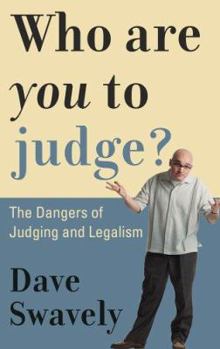Who Are You to Judge?: The Dangers of Judging and Legalism
Select Format
Select Condition 
Book Overview
The sin of judging and the error of legalism cause many of the interpersonal conflicts we experience as believers. Plaguing many of our Christian institutions, from churches to schools to families,... This description may be from another edition of this product.
Format:Paperback
Language:English
ISBN:159638011X
ISBN13:9781596380110
Release Date:November 2005
Publisher:P & R Publishing
Length:224 Pages
Weight:0.62 lbs.
Dimensions:0.6" x 5.9" x 8.4"
Customer Reviews
4 ratings
a very readable and convicting book
Published by Thriftbooks.com User , 16 years ago
Swavely addresses a critical issue: judging others in "disputable matters." Terrific reading for any Christian
Worth reading and much needed
Published by Thriftbooks.com User , 18 years ago
For the believer and non-believer alike, the points made by the author are excellent. This gives an honest, realistic perspective on what happens in many churches and Christian homes. This is a wake-up call for all of us who call ourselves Christian's to be able to evaluate our talk with our walk. The author supports his claims biblically but is down to earth sharing his own struggles with judging. This is a book worth investing in and buying for friends and family. I intend to!!!
A Challenging, Scriptural Book
Published by Thriftbooks.com User , 18 years ago
Who Are You To Judge? by Dave Swavely is a book that deals primarily with legalism. It defines judging and legalism in a biblical manner, and discusses two often-overlooked biblical commands: Do not pass judgment before the time and do not exceed what is written. Swavely teaches that learning to identify and avoid these problems will help promote peace and joy in the body of Christ, and release believers to serve God in the freedom of His grace. All Christians have, at one time or another, borne the brunt of inappropriate judging and the burden of legalism. All Christians have, in all likelihood, been guilty of inappropriate judging and burdening others with legalism. Here are some examples of legalistic, judgmental statements as provided by the author: * "There is no way someone can drive a car that expensive and be a godly man." * "A church that does not serve weekly communion is dishonoring the Lord." * "Rock music is the devil's music and is never appropriate for a Christian." * "God is sickened by the singing of simplistic praise choruses that repeat the same works over and over." * "Birth control robs God of His sovereignty and rebelliously refuses His blessings." * "Any woman who works a full-time job is neglecting her children." * "Smoking is a sin because it destroys the temple of God." * "She's a member of our church, but I don't think she's a true Christian." Swavely defines the sin of judging as follows: "The sin of judging is negatively evaluating someone's conduct or spiritual state on the basis of nonbiblical standards or suspected motives." Said more colloquially, to judge others is to decide that they are doing wrong because they do something the Bible doesn't talk about or because you think you can guess what is in their heart. This is what the Apostle Paul has in mind when he discusses judging, particularly in 1 Corinthians (see, for example, 1 Corinthians 4:5). Similarly, legalism is "creating moral standards beyond what the Scripture has revealed." Through eight chapters and two case studies, the book exposes legalism and points in particular to two grave dangers: first, legalism leads to spiritual pride and arrogance. This causes people to become puffed up because of their attention to extrabiblical traditions. Second, legalism leads to division in the church as Christians allow themselves to become fractured by man-made rules. The book includes two case studies, the first dealing with entertainment and the popular arts and the second with public education. In both Swavely attempts to sort out what is legalistic and what is biblical and arrives at what may be surprising conclusions. The final chapter turns to an examination of the relationship between legalism and the gospel. Swavely differentiates between legalism applied to sanctification and legalism applied to justification and shows how legalism diminishes our understanding of the gospel. "Those who are legalistic in regard to sanctif
Don't read this if you don't want to be convicted
Published by Thriftbooks.com User , 18 years ago
I loved this book and couldn't put it down. The author does an excellent job exposing specifics of a judmental spirit. I was surprised to find out how easily I have sinned in judging others in even the most subtle ways. The difference between sinful and appropriate judging are explained and all references all backed by scripture . In addition, the dangers of legalism and its snowball effect were well spelled out. I loved the personal examples in this book and only wished there were more of them. I honestly can't imagine anyone who doesn't struggle with sinful judging and/or legalism to one degree or another. A great, well written book to benefit all! Looking forward to Dave Swavely's next book!




